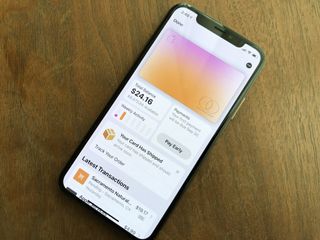iOS 13 beta reveals additional Apple Card onboarding text including marketing and privacy details

What you need to know
- Apple may send you marketing messages based on purchases.
- Apps and websites can check if you have Apple Card.
- You can share past purchases with Goldman Sachs to help your chances of being approved.
Apple Card applications are now open to those who signed up for early access, but what kinds of information are you going to need to hand over? The answers to that question lay in an article shared by The Tape Drive (via The Loop) last month.
Those poking around iOS 13 beta were able to glean some of the requirements for signing up. Now that people can do exactly that, it bears repeating the kinds of information that potential Apple Card customers must share to get their foot in the door. The full onboarding text was also found deep within iOS 13.
Even though much of it is standard fare, there are some interesting tidbits of note.
The one that caught our eye was the fact that users may optionally share their Apple purchase history with Goldman Sachs during the sign-up process. As Steve Moser notes, letting the financier know that you recently purchased an iPhone might help your chances of being accepted.
Intrestingly you may optionally share with Goldman Sachs some of the information Apple knows about you including which Apple products you own. Goldman Sachs will use this information to evaluate your credit i.e. you might have a better chance of getting an Apple Card if you let Goldman Sachs know that you bought a new iPhone, iPad or Apple Watch.
During our testing, we didn't come across an option to allow this, so it's possible it is only presented in specific circumstances — when you're asked to provide additional background information for the application, for example.
Another item of note is the fact that Apple may also target users via email and push notifications based on their past purchases as highlighted in the onboarding text.
Apple may also send messages to your device, which may use information known only to you and your device, such as your transaction history and location, to help determine whether a message is relevant to you. For example, Apple may send a message to your device that is relevant to people who typically purchase travel.
Whether Apple would then be able to use that information to negotiate special deals on your behalf isn't clear, but the potential is there.
Master your iPhone in minutes
iMore offers spot-on advice and guidance from our team of experts, with decades of Apple device experience to lean on. Learn more with iMore!
Finally, apps and websites will be able to check whether a user has an Apple Card or not, but there is an option to disable that via the Settings app if required. It isn't made clear why that is possible, or what benefit it offers the user.
Apple Card and the sign-up process required to get one is definitely less opaque than many credit cards on the market. But it's still a credit card and information will absolutely need to be shared with Goldman Sachs during the application process.
As always, whether that is a problem is something only you can decide. But the data on your spending and the lack of fees that Apple Card offers may well be worth giving out the information anyway.
The full onboarding text is well worth reading, especially if you're considering signing up for the hottest new thing in finance.

Oliver Haslam has written about Apple and the wider technology business for more than a decade with bylines on How-To Geek, PC Mag, iDownloadBlog, and many more. He has also been published in print for Macworld, including cover stories. At iMore, Oliver is involved in daily news coverage and, not being short of opinions, has been known to 'explain' those thoughts in more detail, too.
Having grown up using PCs and spending far too much money on graphics card and flashy RAM, Oliver switched to the Mac with a G5 iMac and hasn't looked back. Since then he's seen the growth of the smartphone world, backed by iPhone, and new product categories come and go. Current expertise includes iOS, macOS, streaming services, and pretty much anything that has a battery or plugs into a wall. Oliver also covers mobile gaming for iMore, with Apple Arcade a particular focus. He's been gaming since the Atari 2600 days and still struggles to comprehend the fact he can play console quality titles on his pocket computer.
Most Popular



